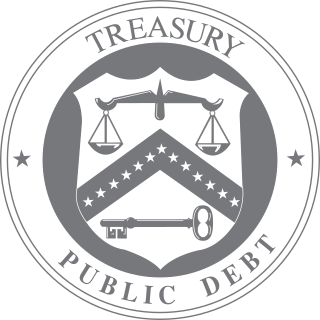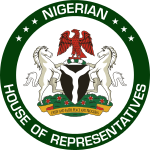In many states with political systems derived from the Westminster system, a consolidated fund or consolidated revenue fund is the main bank account of the government. General taxation is taxation paid into the consolidated fund, and general spending is paid out of the consolidated fund.

The Bureau of the Public Debt was an agency within the Fiscal Service of the United States Department of the Treasury. United States Secretary of the Treasury Timothy Geithner issued a directive that the Bureau be combined with the Financial Management Service to form the Bureau of the Fiscal Service in 2012.

The public sector budget of Germany is divided among the administrative divisions of the country.
PAYGO is the practice of financing expenditures with funds that are currently available rather than borrowed.

The National Assembly of the Republic of Kenya is one of the two Houses of the Parliament of Kenya. Between 1966 and 2013, it served as a unicameral house. In 2013, it became the lower house when the Senate was reestablished.

The Nigerian National Petroleum Company (NNPC) Limited is a state-owned oil company in Nigeria. Still a fully-owned government company, it was transformed from a corporation into a limited liability company in July 2022. NNPC Limited is the only entity licensed to operate in the country's petroleum industry. It partners with foreign oil companies to explore Nigeria's fossil fuel resources. The NNPC, with an asset of $153B (USD), is the largest national oil company in Africa. The company boasts of extensive infrastructure and investment in the downstream, midstream and upstream of the Nigerian petroleum industry.
A government budget is a projection of the government's revenues and expenditure for a particular period, often referred to as a financial or fiscal year, which may or may not correspond with the calendar year. Government revenues mostly include taxes while expenditures consist of government spending. A government budget is prepared by the Central government or other political entity. In most parliamentary systems, the budget is presented to the legislature and often requires approval of the legislature. The government implements economic policy through this budget and realizes its program priorities. Once the budget is approved, the use of funds from individual chapters is in the hands of government ministries and other institutions. Revenues of the state budget consist mainly of taxes, customs duties, fees, and other revenues. State budget expenditures cover the activities of the state, which are either given by law or the constitution. The budget in itself does not appropriate funds for government programs, hence the need for additional legislative measures. The word budget comes from the Old French brunette.

Sabur Oladimeji "Dimeji" Bankole is a Nigerian politician who served as the 11th Speaker of the House of Representatives of Nigeria. Elected at the age of 37, he is the youngest Speaker in the history of Nigeria, as at July 2024. He was the Action Democratic Party candidate in the 2019 Ogun State gubernatorial election but lost to the All Progressives Congress candidate, Dapo Abiodun.
The Ministry of Finance of Ukraine is the ministry of the Ukrainian government charged with developing and implementing national financial and budget policies, and with defining national policies in customs and taxation. The ministry is responsible for ensuring that the state has enough resources to perform its functions and that financial policies promote economic growth.
The Fiscal Responsibility and Budget Management Act, 2003 (FRBMA) is an Act of the Parliament of India to institutionalize financial discipline, reduce India's fiscal deficit, improve macroeconomic management and the overall management of the public funds by moving towards a balanced budget and strengthen fiscal prudence. The main purpose was to eliminate revenue deficit of the country and bring down the fiscal deficit to a manageable 3% of the GDP by March 2008. However, due to the 2007 international financial crisis, the deadlines for the implementation of the targets in the act was initially postponed and subsequently suspended in 2009. In 2011, given the process of ongoing recovery, Economic Advisory Council publicly advised the Government of India to reconsider reinstating the provisions of the FRBMA. N. K. Singh is currently the Chairman of the review committee for Fiscal Responsibility and Budget Management Act, 2003, under the Ministry of Finance (India), Government of India.
According to statute, the Fiscal Assistant Secretary is appointed by the United States Secretary of the Treasury. The Fiscal Assistant Secretary is the highest ranking career official in the Department of the Treasury. The Fiscal Service, which the Fiscal Assistant Secretary heads, includes the Bureau of Government Financial Operations (which since 1984 has been known as the Financial Management Service and the Bureau of the Public Debt.

Abdulmumin Jibrin is a Nigerian politician, businessman, academic, and member of the Nigerian House of Representatives represented Kiru/Bebeji federal constituency of Kano State who was recently re-elected on the platform of the New Nigerian People Party. He served as the Federal Housing Authority's Executive Director of Research and Innovation Development from October 2021 until May 2022, under President Muhammadu Buhari's administration.
Mohamud Abdullahi Sheikh Siraji is a Somali politician who was elected from the state of Jubaland as a member of Federal Parliament of Somalia on 15 February 2018. Mohamud is the younger brother of the late Minister for Public Works and Reconstruction Abass Abdullahi Sheikh Siraji.
The Nigeria national debt or simply national debt of Nigeria is the total amount of money that the Federal Government of Nigeria owes to its creditors, both domestic and external. The national debt is composed of two main components: debt held by the public and debt held by government accounts. Debt held by the public includes Treasury securities held by investors outside the federal government, such as individuals, corporations, the Central Bank of Nigeria, and foreign, state and local governments. Debt held by government accounts includes non-marketable Treasury securities held in accounts of programs administered by the federal government, such as the Nigeria Social Insurance Trust Fund. The national debt is measured as the face value of the outstanding Treasury securities at a given point in time.

The House Committee on Aids, Loans, and Debt Management is a standing committee of the Federal House of Representatives in Nigeria. It is tasked with overseeing the management of the nation's external borrowings, ensuring that loans and foreign aids are used effectively and transparently. The committee evaluates loan requests, scrutinizes their potential impact on Nigeria's debt profile, and makes recommendations to the House.

The House Committee on Basic Education and Services is a standing committee of the Nigerian House of Representatives, responsible for legislative oversight and advancing basic education policies in Nigeria. Working alongside its Senate counterpart, the committee ensures effective implementation of education programs and regulatory frameworks. Its oversight extends to agencies such as the Universal Basic Education Commission (UBEC) and the Federal Ministry of Education, making it an influential body in shaping Nigeria's education sector.

The House Committee on Defence commonly known as HCD is a standing committee of the Nigerian House of Representatives tasked with legislative oversight of the Ministry of Defence and the Nigerian Armed Forces. It is currently chaired by Honourable Babajimi Benson. The committee addresses defense policies, military operations, and national security challenges while advocating for improved funding and infrastructure to strengthen Nigeria's defense capabilities.

The House Committee on Banking and Currency is a standing committee in the Nigerian House of Representatives that oversees the nation's banking sector, currency policies, and financial institutions. Chaired by Hon. Mohammed Bello El-Rufai, the committee collaborates closely with the Central Bank of Nigeria (CBN), the Federal Ministry of Finance, and other regulatory agencies to ensure financial stability and promote economic growth. Through legislative oversight, public hearings, and policy reviews, the committee addresses excessive banking charges and currency management issues while fostering accountability and confidence in Nigeria's financial system.

The House Committee on Communications is a standing committee of the Nigerian National Assembly tasked with legislative oversight of the communications sector, including telecommunications, information technology, and digital economy policies.

The House Committee on Health was established by the Federal Government of Nigeria under the provisions of legislative decrees to oversee the nation's health institutions and ensure effective healthcare delivery. Tasked with legislative oversight, the committee evaluates the performance of health facilities, formulates policies to enhance healthcare services, and collaborates with stakeholders to strengthen Nigeria's healthcare system. Its mandate includes ensuring adequate funding for health institutions, monitoring infrastructure development, and promoting initiatives to improve public health outcomes nationwide.








